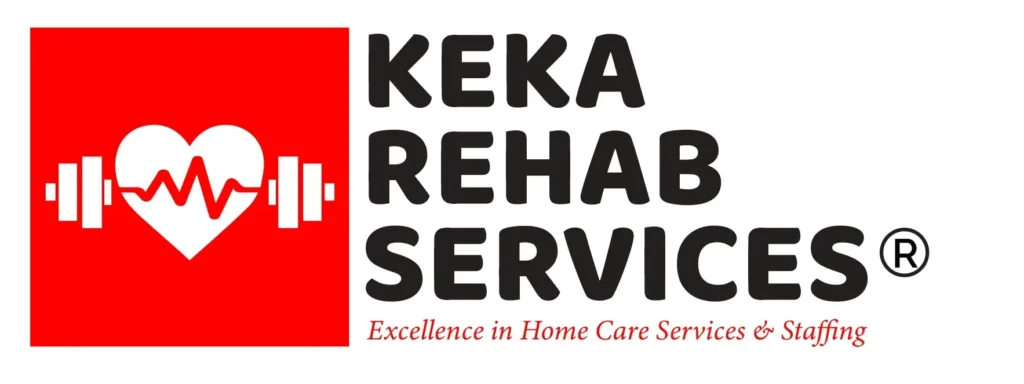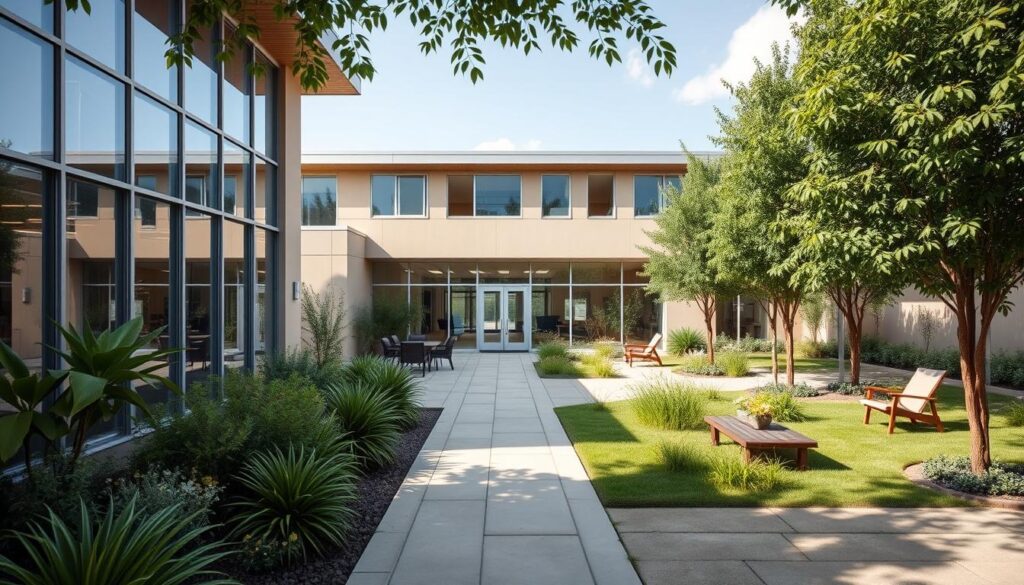Finding the right rehab centers is key to your wellness journey. You might need help with addiction, mental health, or a full rehab program. This guide will show you the best places near you that fit your needs.
Look into different programs like inpatient care and outpatient therapy. You’ll also find holistic healing and sober living homes. All these options are available in your local area.
Understanding Rehab Services
Rehabilitation is a journey that helps people get back to their best after illness, injury, or addiction. It offers a range of programs to support recovery and wellness.
What is Rehabilitation?
Rehab, or “rehab,” is a detailed approach for each person’s needs. It helps those recovering from illness, overcoming addiction, or needing mental health support. Rehab aims to help you regain your independence and improve your life quality.
Types of Rehab Programs
Rehab programs vary to meet different needs. Here are some common types:
- Inpatient Rehabilitation: Residential programs offering 24/7 care, helping you focus on recovery.
- Outpatient Rehabilitation: Flexible programs allowing you to get treatment while keeping up with daily life.
- Physical Therapy: Programs to regain strength, mobility, and independence after injury or illness.
- Mental Health Counseling: Therapies for emotional, behavioral, and cognitive challenges related to mental health.
- Addiction Treatment: Programs combining medical, psychological, and social support for sobriety.
Every rehab program aims to empower you to take back your life and thrive in your wellness journey.
Addiction Treatment Centers
If you or a loved one is struggling with substance abuse, addiction treatment centers can help. These places offer a wide range of care and support. They use evidence-based therapies, medication, and holistic approaches to tackle addiction’s physical, mental, and emotional sides.
At these centers, you’ll meet a team of experts who want to help you stay sober for good. They can create a program that fits your needs, whether you need inpatient rehabilitation or outpatient therapy.
- Individual and group counseling
- Cognitive-behavioral therapy
- Medication management
- Trauma-informed care
- Wellness and holistic activities
- Family and community support
These centers aim to tackle addiction’s root causes in a supportive setting. They help you or your loved one overcome substance abuse. They also teach the skills and strategies for lasting recovery.
Rehabilitation Facilities for Substance Abuse
Rehabilitation facilities are a key help for those fighting drug or alcohol addiction. They offer a safe place where people can get the care they need to recover. These places have inpatient rehab for constant supervision and outpatient therapy for those who can stay at home.
Inpatient vs. Outpatient Programs
Inpatient rehabilitation facilities offer a full treatment plan all day, every day. They are great for those with serious addictions or mental health issues. On the other hand, outpatient therapy lets people keep their daily life while still getting help.
Specialized Addiction Treatment Options
Many substance abuse programs have special treatments like dual diagnosis for addiction and mental health. They use proven therapies like cognitive-behavioral therapy and medication. These services help meet each person’s unique needs, boosting their recovery chances.
Rehabilitation facilities are a crucial step towards sobriety and a new life. They provide a supportive environment and proven treatments. This helps people overcome addiction and start anew.
Mental Health Services and Therapy
Rehabilitation centers offer many mental health services and therapy. These help people deal with their emotional and psychological needs. They help overcome mental health challenges and achieve wellness.
Counseling and Psychotherapy
These centers provide counseling and psychotherapy. They use individual and group sessions, cognitive-behavioral therapy, and more. These therapies help people explore their thoughts and feelings in a safe place.
Through counseling and psychotherapy, patients find the causes of their mental health issues. They learn to manage stress and anxiety. They also get skills to keep their mental health and wellbeing during their recovery.

- Individual therapy sessions
- Group counseling and support groups
- Cognitive-behavioral therapy (CBT)
- Mindfulness-based interventions
- Trauma-informed care
These mental health services and therapies address both physical and mental needs. They are key to long-term wellness and recovery.
Holistic Healing and Wellness Programs
Starting your rehabilitation journey, you might find centers with holistic healing and wellness programs. These new therapies focus on the mind-body connection. They help you find new ways to recovery and rehabilitation.
Yoga, meditation, art therapy, and nutrition counseling are part of these alternative therapies. They are key to your holistic healing journey. Adding these wellness programs to your rehab can unlock the mind-body-spirit connection. This leads to a deeper healing and recovery.
Looking to tackle emotional, psychological, or physical issues? These holistic healing and wellness programs offer a fresh, empowering choice. A holistic approach opens new paths for growth, stress relief, and lasting rehabilitation.
- Yoga and meditation for stress management and mindfulness
- Art therapy for emotional expression and self-discovery
- Nutrition counseling for optimal physical and mental well-being
- Acupuncture and massage for pain relief and relaxation
Start a journey of holistic healing and find the strength of your mind, body, and spirit. Let them support your rehabilitation and recovery journey.
Sober Living Homes and Aftercare Support
Recovery is a tough journey, but sober living homes and aftercare support make it easier. These places help people stay sober and fit back into their communities. They are key to a successful recovery.
Transitional Housing and Peer Support
Sober living homes, or transitional housing, offer a safe, drug-free space. They help people in recovery build their sober skills. Here, they get peer support as they go back to work, reconnect with family, and become independent again.
The peer support in these homes is very helpful. People share in group activities, counseling, and social events. This builds a community and keeps them on the path to recovery.
Aftercare support programs are also vital for long-term rehabilitation. They offer counseling, support groups, and alumni activities. These programs act as a safety net for those in recovery.

Sober living homes and aftercare programs work together to create a strong foundation for a sober life. This approach to rehabilitation and recovery greatly increases the chance of success.
Centers for Rehab Services Near You
Looking for the right centers for rehab services means finding local rehabilitation facilities that fit your needs. Online resources and directories can help you find addiction treatment centers and mental health services close to you.
It’s key to check the quality and accreditation of these places. Look for centers with recognized accreditations, skilled staff, and treatments backed by science. These factors ensure the best care for you.
Locating Nearby Facilities
Begin by using directories and databases focused on centers for rehab services. They can show you local rehabilitation facilities that match your needs. Whether it’s for addiction, mental health, or other programs, you’ll find what you need.
Evaluating Quality and Accreditation
After finding potential addiction treatment centers or mental health services, do your homework. Check their quality and accreditation, staff qualifications, treatment methods, and how happy patients are. This research helps you choose the best fit for you.
By actively researching centers for rehab services in your area, you can find the right support. This ensures you get the help you need for your rehabilitation journey.
Navigating Insurance and Financial Assistance
Getting quality rehab services can cost a lot, but help is out there. Knowing what your insurance covers and looking into financial aid can ease the burden. Many rehab centers help with insurance and offer financial support like sliding-scale fees and payment plans.
Understanding Coverage and Out-of-Pocket Costs
Start by checking your insurance plan to see what rehab costs are covered. Your plan might pay for all or part of the services. Many centers also have financial aid programs to lower your costs.
It’s smart to talk to the rehab center’s billing team or financial advisors. They can explain your insurance and help find ways to pay that fit your budget. They’ll guide you through understanding your policy, estimating costs, and finding payment plans that work for you.
FAQ
What is rehabilitation?
Rehabilitation helps people get back to normal after illness, injury, or addiction. It includes many programs like inpatient and outpatient care, counseling, and holistic therapies. These aim to help you or your loved one recover fully.
What types of rehab programs are available?
There are many rehab programs. Inpatient care offers 24/7 support, while outpatient programs let you stay home. You can also find specialized programs like dual diagnosis and evidence-based therapies.
What are addiction treatment centers?
Addiction treatment centers provide care for those struggling with substance abuse. They offer therapies, medication, and holistic approaches. Whether you need inpatient or outpatient care, these centers help achieve sobriety.
What are rehabilitation facilities for substance abuse?
These facilities offer a safe place to fight drug or alcohol addiction. They have inpatient and outpatient programs. You can also find specialized treatments like dual diagnosis programs.
What mental health services and therapy are available?
Rehab centers offer mental health services and therapy. They include counseling, cognitive-behavioral therapy, and more. These help individuals overcome mental health challenges and achieve wellness.
What kinds of holistic healing and wellness programs are offered?
Many centers offer holistic programs like yoga, meditation, and nutrition counseling. These programs help with the mind-body connection and promote well-being.
What are sober living homes and aftercare support?
Sober living homes and aftercare support are key in recovery. They provide a drug-free environment and support as you transition back into society. Aftercare support helps maintain progress and prevent relapse.
How can I find centers for rehab services near me?
Look for local rehab facilities that meet your needs. Use online resources and directories to find addiction treatment centers and mental health services. Consider factors like accreditation and treatment approaches when choosing a provider.
How can I navigate insurance and financial assistance for rehabilitation services?
Getting rehab services can be costly, but there are ways to help. Understand your insurance and look for financial assistance. Many centers offer guidance on insurance and financial support to make care accessible.








